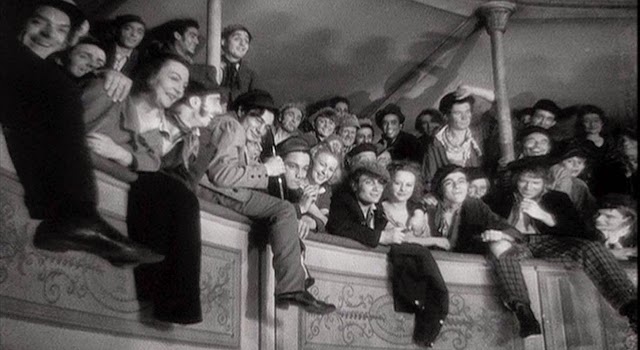Children
of Paradise was a highly-regarded film in
French cinema. Marcel Carné has provided
a grand finale to the style of Poetic Realism in this epic love story. The
paradise, in a sense, is where the gods reside - but not in a religious sense.
‘Paradis’ in French refer to the highest positioned - and hence the cheapest
seats - in a theatre (in English we call those ‘the gods’). So, the children of
the paradise were the common everyone that Poetic Realists were most interested
in.
The
story concerned some sort of a goddess in the name of Garance who has caught
attention of no less than 4 male contenders, of various antic dispositions. She
was likely to be in true love with Baptiste
the pantomime artist, yet their relationships were almost Platonic. The other 3 men could not afford sincere
love, their intentions were far more instrumental and the facades they
possessed would p only prevent Garance from a closer bond to any of them.
Indeed, bad blood was stirred up among this trio. Eventually, mademoiselle Garance would be inaccessible
to any one of these, and she disappeared amidst a bunch of pale Pierrots.
‘Shut
up! We can’t hear the mime!’
The
theater scene in ‘Les Enfants du Paradis’ was a portrait of the real world we
situated in, and the realism was achieved by illustrating its carnival-esque
side. This was spectacularly executed by a deep focus shot that showed the mass
of audience at the paradise section. Garance’s odyssey represents a flow
between truth and deceptions, real and theatrical, authenticity and pretentiousness.
Carné was capable to reconcile all these opposites, as signified by the
smoothness of the sequence, and that led to the blurring of reality and
fiction.
Garance’s
tool of trade involved a 360° round-a-bout in a bathtub when she was inspecting
herself in the mirror. To me, this famous scene represented a deconstruction, a
breakdown of dialectics. Garance, in a sense, was asking ‘am I watching or am I
being watched’, and her introspection with the mirror suggested she was
pondering her being. Indeed, some critics believed that Garance was a symbol
for ‘cinema’, and there were some truths to it. The deconstruction of ‘subject’
and ‘object’ was complimented by a shift of focus from a more traditional film
theory (i.e. the gaze theory) to a more reader-oriented / hermeneutical theory.
The focus was not about what the director wanted the viewer to see, but rather
the audience took the liberty to draw their own conclusions from their viewing
experience.
A key theme in ‘Les Enfants du Paradis’ is that of
‘displacement’. Things are misplaced and conceptions are faultily designated
throughout the film. Baptiste would be able to acquaint with Garance on
numerous occasions, but their romance could never flourish. Baptiste’s real
wife, as a result, suffered because he could not afford any real love to her.
Too many times, Garance was accused of crime she didn’t even commit. Frederick,
the actor, could completely distort a script he tried to adapt, switching a
melodrama into some sort of a farce, which insulted the original authors
gravely. When Baptiste learnt of the fact that Garance has been watching him
perform so many nights, he rushed to her box, only to find she has already
departed. When the three men verbally sparred with each other to determine who
deserved Garance the most, the unveiling of a curtain only showed the truth
that Baptiste and Garance deserved each other. In the film, this paradise was
in no way a heaven that granted wishes. All forms of displacement became almost
prevalent in such a real, brutal and chaotic world.
Too often, poetic realism is about the
reconciliation of the 2 ends of the dialectics, namely the truth and the
fiction. Transcendence was another key theme in ‘Les Enfants du Paradis’,
because a lot of thin lines have been crossed. We could see actors in the play
mingling in the audience, and a talking mime around. All these rules have shown
artificialities, which suggested the oppositions were futile. When Garance was
accused of stealing, Baptiste
stood up for her. But instead of giving descriptions verbally, he literally
acted out the whole situation using pantomime techniques. Not only the act was
fascinating (that’s what we call ‘cool’), I believe Baptiste’s style was
emblematic of the spirit of Poetic Realism – what he did was to ‘represent’ the
theft. Based on a careful observation of an objective truth, he used an art
form to illustrate that and resulted in a significant realism. The motivation
behind this was that of justice, rather than the various nefarious motives the other
3 men had when they approached a goddess like Garance. Yet the end was
bittersweet, as none of the men would sustain any relationships with her, and
she would lose herself again in a word of masks. This really gave Poetic
Realism a rather tragic finale.
Poetic
Realism (2/3)
by
Ed Law
8/3/2015
Film
Analysis - 36






